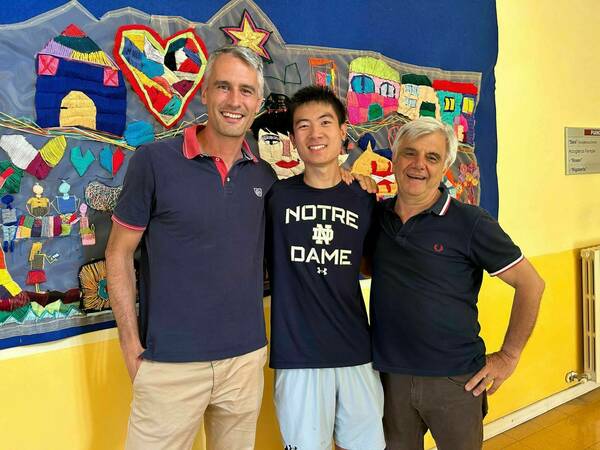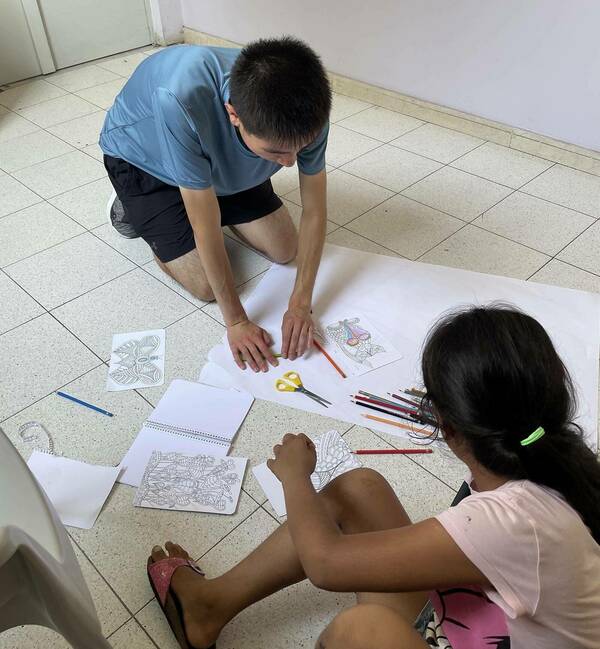
Bryan Fok ’25 is a junior studying global affairs and history at the University of Notre Dame. During the summer of 2023, he traveled to Milan, Italy, as part of the Serving (in) Europe program, supported by the Nanovic Institute for European Studies. This program offers opportunities for students to travel to Europe and engage in service work addressing the most critical areas of need within local communities through partner organizations in countries like Italy, Bulgaria, Slovakia, and Poland.
When I first told a friend that I was spending the summer doing service work in Milan, she responded dismissively, “What is there to do there? Are you going to be holding shopping bags for tourists?” She had reason to dismiss the idea of doing service work in Milan, generally considered the heart of Europe. As the core of the wealthy Lombardy region of Italy, finding those who are neglected in the city is not an easy task for most people who take a cursory glance and conclude that there is nobody in need of support.
But that is not the case. Through my eight weeks in Milan working with Caritas Ambrosiana, I shuffled through three different sites and saw many different marginalized groups in the community. During my first week in Milan, I worked at the Refettorio Ambrosiano, a soup kitchen for the poor. There, I learned about the needs of food-insecure people. All the meals at the Refettorio are prepared using wasted food donated by various restaurants and supermarkets around the city. It was astonishing to see how much good food can come together from the leftovers of various establishments around Milan.
Clearly, one can find poor and marginalized people within one of the most modern and cosmopolitan cities in Europe.
For the next four weeks, I worked at Casa della Carità, which welcomes and provides services to poor and homeless people as well as immigrants. There, I helped with a variety of services—from sanitizing the showers to being a chaperone on summer camp field trips to assisting the immigration lawyer on site. I was able to learn about topics of interest to me, such as asking the doctor on site about how the health of poor immigrants is affected by their legal status. I forged many friendships at Casa della Carità, and they invited me to functions outside of work, for which I was very grateful.

For the final three weeks, I worked at Casa Suraya, a reception center for asylum-seekers and single women. There, I planned and participated in activities for the children. As school was out and summer camps were not running in July, the kids needed something to keep them occupied. By planning fun games and activities, I provided the support that they needed and learned about their ordeals getting to and staying in Italy. One kid claimed to have walked with his dad all the way from Pakistan through the Balkan Route into Italy.
Clearly, one can find poor and marginalized people within one of the most modern and cosmopolitan cities in Europe. However, I noticed that many of these people are also held back by prevailing Italian attitudes on identity. Many of the people I worked with are people of color, and for many Italians, identity is determined by blood. Even within Italy, people living in Milan who were born in southern Italy, for example, are not considered Milanese. Instead, they are still Neapolitan or Sicilian despite living in Milan for many years. Likewise, people born outside of Italy are not considered Italian, no matter how much they integrate into Italian society.
These perceptions on the question of identity affect how Italians treat the marginalized groups with whom I was working. Because many of those whom I worked with were not considered Italian, they were sometimes seen as less deserving by the rest of society. Those perceptions of identity also affected me during my stay in Italy. On multiple occasions, Italians doubted whether I am truly American since I have Asian heritage. I would always have to point out that I was born in the United States and am, thus, American. It is only recently that there has been an uptick in immigration into Italy, so Italians have not had to grapple with their concept of identity as other multi-ethnic states, such as the United States, have.
But my experience was not tainted by the different approaches to identity in Italy. I still had a great time, having been able to explore much of Northern Italy in my free time and forging connections with the locals. I was able to improve tremendously in the Italian language as well. Participating in the Serving (in) Europe service-learning program has been incredibly eye-opening, so I am incredibly grateful to the Nanovic Institute for providing this opportunity. Given that I will return to Italy next spring to study abroad in Rome, I cannot wait to visit Milan again to connect with the new friends I made over the summer.
Learn More and Apply for Serving (in) Europe
Originally published by at nanovicnavigator.nd.edu on November 01, 2023.